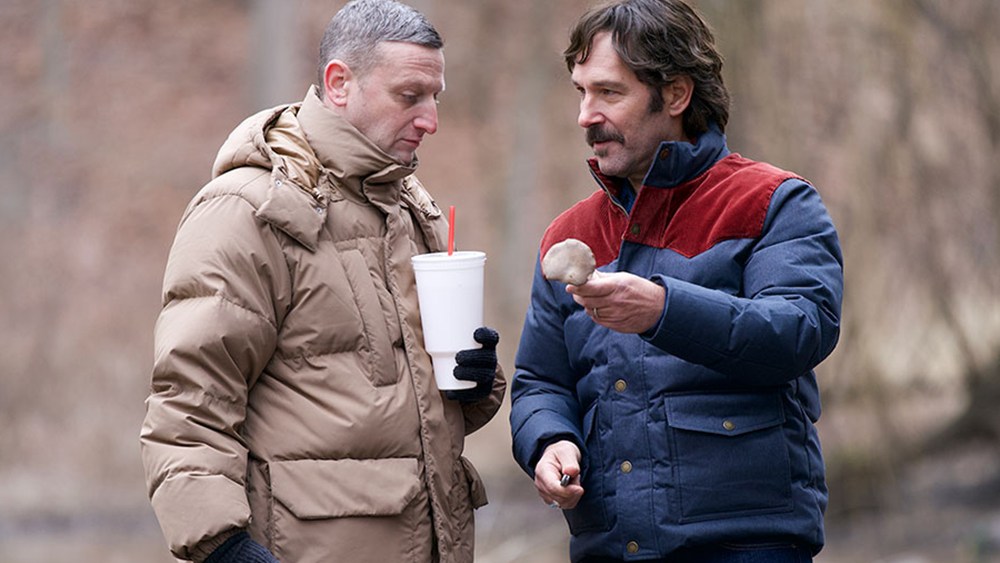When you first see Tim Robinson, he may remind you of a lot of other rubber-faced, madcap-furious walking-id comedians. With his grim leer, turtle-like demeanor, and eyes that pop with oddball intensity, he could almost be the son of Rodney Dangerfield. He specializes in slow-burn meltdowns, working his way up to a kitsch fury that’s a hair’s breadth from the real thing. In that way, he’s a cousin to blowing-their-stack jokers like Will Ferrell or the young Jim Carrey.
But Robinson, who started out on “Saturday Night Live” before moving onto the maniacally inventive Netflix comedy series “I Think You Should Leave with Tim Robinson,” may also be the first sketch comedian who seems inhabited by the ghost of Jean-Paul Sartre (or maybe Willy Loman). When he plays a passive-aggressive corporate geek who keeps saying testy and inappropriate things, he’s not just acting out the standard anger of the repressed office drone. He’s showing you the hidden dread as well. It’s no wonder that Robinson has become a cult star. He’s the kind of cringe comedian who makes you squirm more than he makes you laugh — and that, in an odd way, is a testament to the frayed-nerve fearlessness of his talent.
“Friendship” marks the first lead role he’s had in a movie, and it’s very of the moment — and very Tim Robinson — that rather than ease his way onto the big screen the way that Carrey or Adam Sandler did, by playing an audience-pleasing pest, Robinson plays the kind of pest who exists to make the audience uncomfortable. It’s as if he’d already cut to the place that Carrey did with “The Cable Guy.”
Robinson plays a suburban husband and father named Craig Waterman, who we meet at a support group for cancer survivors. Craig’s wife, Tami (Kate Mara), has been cancer-free for a year, and she seems a serious and grateful person. So when Craig makes a comment that’s meant to be caring but is clearly all about him, you may wonder, from the start, why Tami is married to this ordinary guy who already seems to be a closet freak.
Back home, at the house they’re in the midst of trying to sell, Craig receives a package in the mail that was meant for a house down the street. (This keeps happening.) He walks the package down the block, over to the other house, and knocks on the door. The man who answers, Austin Carmichael (Paul Rudd), has just moved into the neighborhood, and he’s disarmingly friendly, a kind of shaggy sweetheart bro. He invites Craig inside, and just like that the two of them are hanging out, which Craig doesn’t quite know what to make of, since he’s someone who has no friends.
One of my favorite comedies of the last two decades was “I Love You, Man” (2009), in which Paul Rudd plays a dude so sensitive that he’s shy to the point of being uncomfortable about becoming buddies with a slightly more macho dude played by Jason Segel. Depicting a platonic friendship as a “romance,” the film captured something droll about the middle-class male anxieties of our time. The first odd thing about “Friendship” is that the movie pings, quite deliberately, off “I Love You, Man,” only now it’s Robinson’s Craig who’s the abashed and insecure one, and Rudd’s Austin who’s the macho fraternal “love object.” The second odd thing about the movie is that Austin is a local TV weatherman, and he’s coiffed exactly the way Rudd was in “Anchorman: The Legend of Ron Burgundy” — scruffy hair, thick dark ’70s mustache and sideburns. These bits of movie-lore background lend the film a stylized, ever-so-slightly meta dimension.
Yet the truly odd thing about “Friendship” is that while we may think, at first, that we’re watching a comedy about a sad-sack geek who’s drawn out of his shell, the film always makes sure that Craig, as inhabited by Robinson, is a notch weirder and more off-putting than we expect.
For a while the friendship “takes,” even though Craig keeps doing things like dropping his phone in the mud. His constant screwups are an expression of his karma — his need to sabotage himself and everyone around him. He’s an eager geek but also a schmuck, a loser, a clueless quasi-asshole, someone who seems to exist on some antisocial spectrum of his own devising. But he’s got a corporate job that has given him bromides to live by, so when Austin tells him that he wishes he could move from the morning weatherman slot to a place on the nightly news, Craig says: Go for it. And Austin does. He gets the job, which makes him think that Craig is his good-luck charm.
But the buddy nirvana doesn’t last long. Austin invites Craig to come over and party with his circle of pals, and the evening turns into a disaster. Craig’s problem — or one of them — is that he can’t hang. He doesn’t know how to. Or maybe it’s that his closeted ego won’t let him. This is the funniest sequence in the movie, because we see how Craig’s personality is designed to unravel the connection between himself and anyone else. It all climaxes in a moment of shock comedy, after he’s done something very wrong (knocked Austin out in a “friendly” sparring match), at which point Craig jams an entire bar of soap into his mouth and stands there telling the other guys, “I’m sowwy!”
By now we’re convinced that Craig has lost his mind. And that’s a testament to how far Tim Robinson is willing to push a character — right over the edge. But it turns into a problem for the movie, since going forward we no longer have a solid point of identification. Written and directed by Andrew DeYoung, “Friendship,” for its first half hour or so, gives Craig a masochistic relatability. But once he loses his grip, we’re simply watching him become more and more unhinged. And that happens to the film too. “Friendship” is like the story of an “SNL” sketch character who finds himself in the middle of an Ari Aster nightmare. By the time he takes Tami down into the city’s hidden aqueduct, a special place that Austin showed him, we can hardly tell what he’s up to, and the laughs begin to leak away.
“Friendship” is being released by A24, so the odder it gets the more that its cringe comedy invokes a theater-of-the-absurd cool factor. Yet despite promising moments, and a gamely appealing performance by Rudd (even his lush hair isn’t what it seems), the movie, after a while, starts to feel like it’s for Tim Robinson cultists only. Robinson’s brand of middle-class psycho surrealism works perfectly in bite-size sketch-comedy doses. Stretched out to feature length, a character like Craig simply stops making sense. But does Robinson have a future in the movies? Absolutely. I could see him starring in a live-action version of “The Simpsons.” He’s a new screen type: a mad-dog nebbish who hates himself and is full of himself at the same time. But it can’t be the measure of his comedy that he shuts us out more than he invites us in.
Read the full article here








